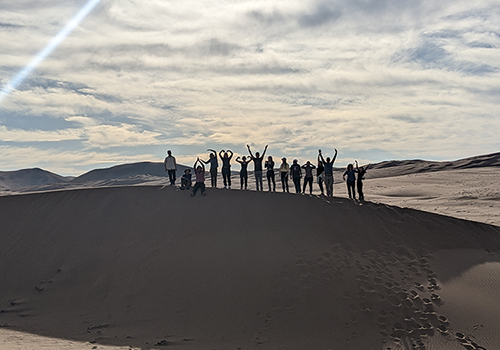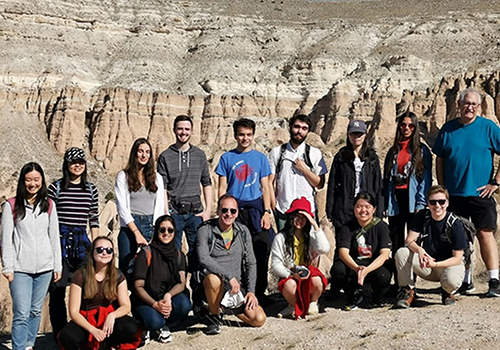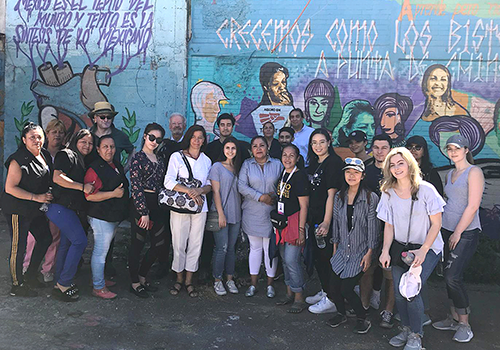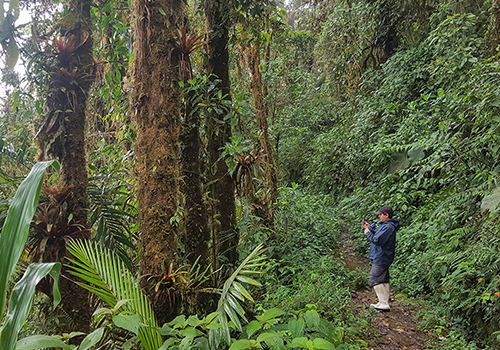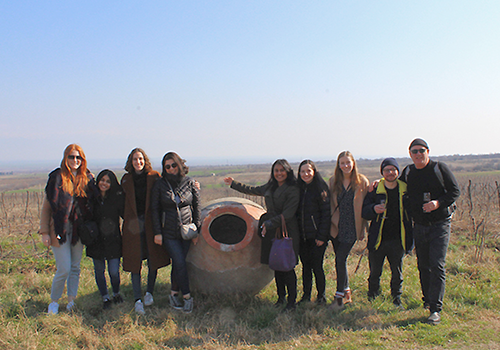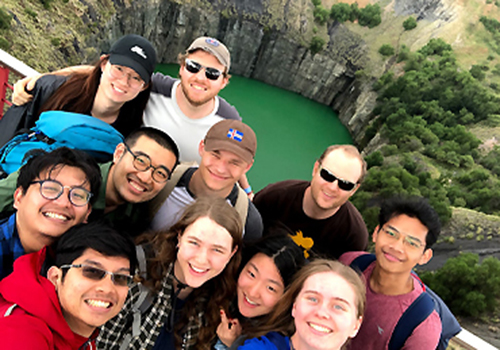
Spend Reading Week Travelling & Learning
International Course Modules are a great way to enhance your course learning by participating in an international experience. In each 0.5 or 1.0 credit course, a small number of students can travel outside Toronto for immersive, course-related, faculty-led experiences during either the Fall or Winter Reading Week. The Faculty of Arts & Science covers travel and living expenses for students and faculty members.
International and Indigenous Course Modules have been separated into two distinct programs. Click here for information about Indigenous Course Modules.
Benefits of International Course Modules
By participating in an International Course Module, you can:
- Strengthen your ability to draw connections between theoretical course concepts and your international experience
- Gain a deeper understanding of complex concepts, ideas, information and perspectives
- Gain meaningful experiences that can help with your applications for jobs, graduate studies, professional faculties and volunteer roles
- Bond with fellow students and instructors and build a stronger network of professional support
Who is Eligible to Participate?
Courses with International Course Modules are open to students in any year. To be eligible, you must be:
- A full-time undergraduate degree student in the Faculty of Arts & Science — St. George campus (exchange or non-degree students are not eligible to receive funding)
- In good academic standing
- Enrolled in the course that offers the International Course Module
Is There an Additional Cost?
International Course Modules are covered through your regular tuition fees. Students are required to contribute $200 to help offset travel costs.
Courses with International Course Modules
| Course | Instructor | Description | Location | Travel Period |
|---|---|---|---|---|
| AMS330H: Transnational America |
The United States, as a global military, cultural and economic power, is a transnational space. This class will study Transnational America through an exploration of Southern California. This International Course Module will invite students into a range of field experiences related to the US-Mexico border, migration, global logistics, and the U.S. military in and around San Diego and Los Angeles, California. These experiences will include site visits, interviews, walking tours, museum visits, guest lectures, and more. Students will integrate their field work with secondary sources to produce an independent research project. |
Leah Montange | Southern California, US | Winter 2025 Reading Week |
| ANT317H: Archaeology of Eastern North America | For this place-based learning opportunity, students will visit key archaeological sites in south-central Ohio, U.S. with an emphasis on some of the region’s spectacular mounds and earthworks, built 1700-3000 years ago. We will also meet with Indigenous and non-Indigenous scholars about the value of these sites and their meaning in the contemporary world. Students will be assigned mini-research agendas for this trip that ask them to explore questions of monumentality, landscape, public presentation and how Indigenous historical narratives might differ from archaeological or state narratives. Students will give a brief presentation to their class upon their return. | Katherine Patton | Ohio, US | Winter 2025 Reading Week |
| CAS400H: Capstone: Global Migrations in Asia: Patterns, Processes, People | The course module is part of the Contemporary Asian Studies curriculum's focus on political-economy, migration and development, preparing students for the capstone course CAS400H with hands-on experience in Asia. The course module focuses on migration to and from Singapore, highlighting the rapid growth of South-South migration within Asia, which far surpasses South-North migration. This module will allow students to explore critical social questions about sustainability, inequality, transnational relations and rural-urban dynamics through field research and case studies in cities like Myanmar, Singapore and Jakarta. Students will examine how migration affects social cohesion, immigration policy and grassroots social dynamics, providing a comprehensive understanding of the political-economy and development patterns in Asia. | Rachel Silvey | Singapore | Cancelled for 2024-2025 |
| ESS241H: Geologic Structures and Maps ESS445H: Earth Materials Global Tectonics |
This trip will explore the unique tectonics and human-planet interactions of Southern and Central Anatolia (Turkey). Anatolia has important active and past tectonics that students can only fully appreciate with a field visit to specific geological field sites there. In addition, the past and present-day human life in the region is intricately linked to the regional geology and tectonics: e.g., vast underground cities were carved into the soft volcanic tuffs and inhabited at stages from Hittite to early Christian times; local volcanic activity shaped the mythos of civilizations indigenous to the region; earthquake seismic activity continues to threaten human settlement in Anatolia. | Grant Henderson and Russell Pysklywec | Istanbul, Turkey | Fall 2024 Reading Week |
| EEB384H: Diversity of Amphibians and Reptiles | Students will travel to Ecuador to gain first-hand experience with tropical reptiles and amphibians in their natural habitats. Led by the course instructor and two Ecuadorian professors from Pontificia Universidad Católica del Ecuador (PUCE), along with another U of T EEB professor, students will conduct a one-week herpetological survey expedition in Yasuni National Park, observing, identifying and photographing reptiles and amphibians, with a base of operations at a PUCE-affiliated research station. Students will participate in daily surveys, document their observations in field logs and synthesize these into a shared inventory. Students will also spend a day at Yanayacu, a high-elevation Andean cloud forest site, to observe changes in herpetological communities with elevation gain. | Luke Mahler | Yasuni & Yanayacu, Ecuador | Winter 2025 Reading Week |
| HMB323H: Global Health Research |
The course module will offer practical opportunity to observe major health concerns in Greece, currently magnified by the double burden of the economic crisis and ongoing influx of migrants fleeing strife in Africa, Asia and the Middle East. The students will be introduced to local efforts aiming to meet the health challenges, including research at local universities, healthcare delivery at public hospitals, activities of grassroots organizations (e.g. NGOs and solidarity movements) and innovative health tech start-ups, as described in the itinerary. The students will explore the sociopolitical context of global health in Greece and align the goals of the course module to course-specific objectives. In each iteration of the course module, the students will undertake a research project, which extends the work from the previous course module. |
Maria Papaconstantinou & Helen Dimaras | City Athens, Greece | Winter 2025 Reading Week |
| Course | Instructor | Location |
|---|---|---|
| AMS310H1 - Approaches to American Studies | Leah Montange | San Diego & Los Angeles, USA |
| ANT319H1S - North American Archaeology | Katherine Patton | New Mexico |
| CAS400Y1Y - Capstone Seminar – Critical Perspectives on Asian Modernity | Rachel Silvey | Singapore |
| CRI427H1S - Organized Crime and Corruption | Matthew Light | Mexico City |
| ESS221H1F - Minerals and Rocks | Grant Henderson and Russell Pysklywec | Central Turkey (Cappadocia, Nevsehir, Goreme—A UNESCO Geological World Heritage Site), Istanbul |
| ESS222H1S - Petrology and ESS423H1S - Mineral Deposits | Xu Chu and Daniel Gregory | South Africa |
| ESS223H - Earth Materials & ESS445H - Global Tectonic | Grant Henderson and Russell Pysklywec | Central Turkey (Cappadocia, Nevsehir, Goreme—A UNESCO Geological World Heritage Site), Istanbul |
| ESS423H - Mineral Deposits & ESS322H - Igneous Petrology | Daniel Gregory and Corliss Kin I Sio | Chile |
| HMB323H1S - Global Health Research | Helen Dimaras and Maria Papaconstantinou | Athens, Greece |
| HMB440H1S - Dementia | Franco Taverna | The Netherlands |
| POL359Y1Y - Enlarging Europe: The European Union and its Applicants | Robert Austin | Tbilisi and Signagi, Georgia |
Dates and Application Process
Before the travel period, you will need to do the following:
- Attend orientation sessions with your professor and U of T staff
- Complete Safety Abroad requirements if travelling outside of Canada
- Prepare travel documents as required, well in advance. You are responsible for ensuring you have valid travel documents, such as a passport and visa, to enter and exit the destination. The costs associated with travel document applications are not funded by the university. Contact Professional and International Programs, Woodsworth College (pip.international@utoronto.ca) if you need a supporting document for your travel document application.
- Complete immunizations and travel documents as required. Check whether there are required and recommended vaccinations on the Government of Canada Travel Vaccinations page. You should also check with a health care provider as soon as possible regarding vaccinations or other health concerns. Vaccinations are not funded by the university.
Refer to the list of International Course Modules above and enrol in the courses before the deadline to enrol in courses.
In some courses, there might be an additional application to participate in the course module. The course instructor will share those details in the class.
Priority will be given to students who previously have not received funding from the following A&S experiential learning programs: International Course Modules, Indigenous Course Modules or the Research Excursions Program.
If you require accommodations, please contact Accessibility Services and the Experiential Learning and Outreach Support office (experiential.artsci@utoronto.ca) well in advance of the trip to identify and develop any necessary accommodations.
Participation in International Course Modules should not impact your progress or ability to meet deadlines in other courses.
Please contact the Office of Experiential Learning and Outreach Support (experiential.artsci@utoronto.ca) if you have any questions.
International Course Modules in the News
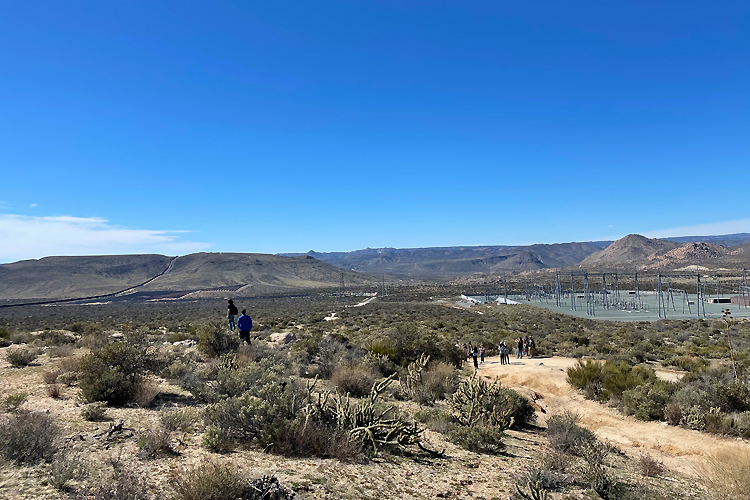
As part of the Transnational America International Course Module, Professor Leah Montange and her class travelled to California to experience spaces that have been shared through transnational forces such as political, economic, religious and cultural forces. The group looked at Los Angeles’ shipping port and the supply chain and learned about migrant workers.
Read more about their experience: A remarkable field trip shows students a different side of California
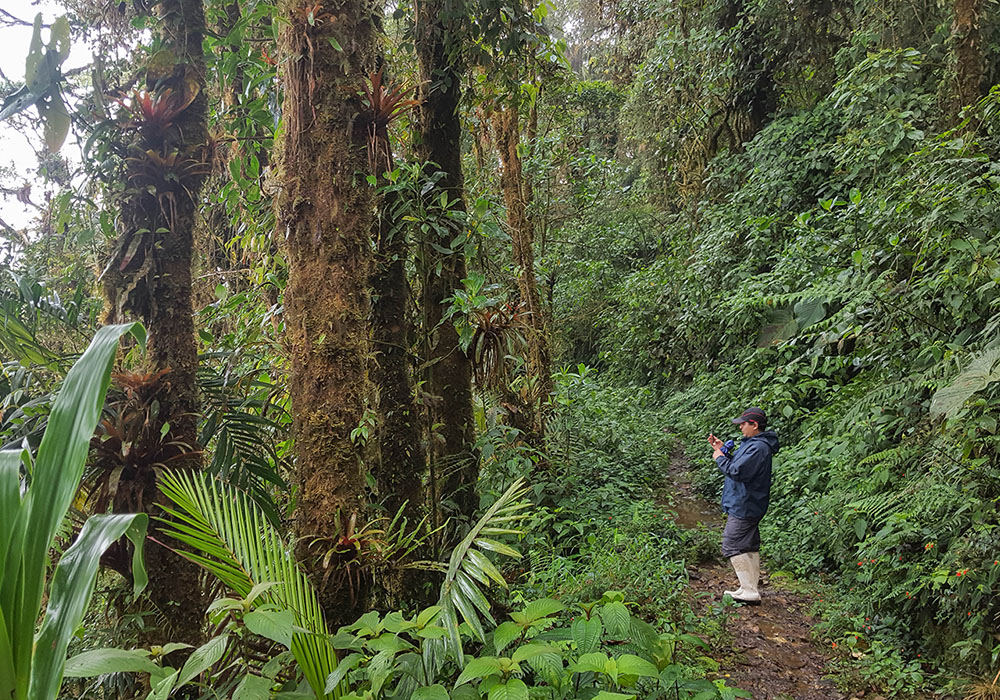
In the Diversity of Amphibians and Reptiles course, Professor Luke Mahler took 14 U of T students to Yasuni National Park in northern Ecuador to spot and study inhabitants of the rainforest. For these students, seeing the bright blue eyes of a rarely seen banded tree anole lizard staring down at them was unforgettable. They also met members of the Huaorani tribe (an especially reclusive community), saw a dwarf caiman (like an alligator) swimming in the Tiputini River and explored the ecosystem of the Andean cloud forest — something few people in the world get to do.
Read more about their experience:Exploring rainforest trails and career paths in Ecuador


